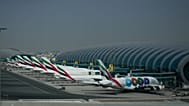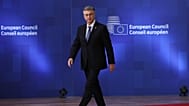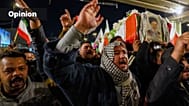The European Union and NATO should open their doors to all countries who want to join, Poland's President Andrzej Duda says.
The European Union and NATO should open their doors to all countries who want to join, Poland's President Andrzej Duda says.
 ADVERTISEMENT
ADVERTISEMENT
 ADVERTISEMENT
ADVERTISEMENT
Speaking at the World Economic Forum in Davos, the Polish president said countries such as Moldova and Georgia should enjoy the same welcome as his country did.
"Poles are in favour of an open door policy to both the European Union and NATO," he told Euronews' Sasha Vakulina. "Why? Among other things, because we ourselves once experienced this policy. If we are supporters of democracy, in the best sense of the word, then it is the nations that have the right to decide whether they belong."
Watch the interview in the video player above
Interview Transcript
Sasha Vakulina, Euronews: We're getting close to the 24th of February, the date that would mark one year since Russia's full-scale invasion into Ukraine. Poland has been at the forefront in so many aspects during this year. I want to ask you, how has Poland changed during this year?
Andrzej Duda, President of Poland: Poland has changed a lot. Poles spontaneously drove to the border, opened their homes, came in their cars, took refugees, those who were fleeing the war, those who had taken refuge in Poland. As many times as I am in Ukraine, as many times as I meet defenders of Ukraine, soldiers, commanders, as many times I say: listen, fight calmly, defend the state, fight against Russian aggression. Your wives, your children, your mothers, your sisters who have come to us, to Poland, are safe. Today, the Ukrainian language can be heard everywhere in Poland, in every public institution, in every shop, on the tram, on the bus, on the street, everywhere. This is our reality today. We live together, we feel good together. We are, one could say, two friendly or even brotherly nations. And for us, in terms of military security, it is a great demonstration, not only to us as a society, but also to the whole world, that independence, freedom, is not given once and for all, that independence can be lost as a result of aggression. A free, sovereign, independent country has been brutally attacked; the brutal Russian invader destroys houses, fires missiles at civilian settlements, kills people. This is a huge shock to the world. For us, all the more mobilisation to strengthen our security.
Sasha Vakulina: Do you think these calls for stronger security and more security concerns will be reinforced after you speak at Davos and after this message being so loud here at the World Economic Forum?
Andrzej Duda: The truth is that this economic forum, which has always had this kind of mostly economic profile, today is hugely dominated by security issues. Of course, this security is also observed not only through a military, purely military prism. We do, of course, talk about the fact that Ukraine needs to be supported, and that it is essential to send arms aid to Ukraine all the time if it is to defend itself and fend off Russian aggression. This is why we spoke so much yesterday about the Polish initiative to send Leopard tanks to Ukraine, so that, as part of allied aid from various countries, we could gather together these Leopard tanks and create at least an armoured brigade for Ukraine. We are also talking about energy security, we are talking about Europe's energy independence, and we are talking about the fact that the Russian policy, as we now all see, was brutally designed and aimed at domination over Europe, hence Nord Stream 1 and Nord Stream 2. This is also the reason for our Polish protests against Nord Streams, as we saw in it a path to Russian hegemony in the European energy market, in terms of gas. We have been diversifying gas supplies to Poland for years, because we saw the danger. Unfortunately, our warnings were ignored. That's why today we are talking in Davos about building energy security with our heads held high, because we have been doing it for a long time.
Sasha Vakulina: There are lots of warnings that have been voiced by Poland in the past when it comes to energy security, when it comes to economic dependence, when it comes to the whole security situation. How do you think the war in Ukraine has changed Europe's geopolitical security dynamics for Poland and Eastern European countries?
Andrzej Duda: Firstly, something that certainly surprised Putin and the Russian aggressors. Unity, the unity of the European Union, the unity of NATO. Something that has not been so clearly present until now, because the Russians did not encounter such unity either in 2008, when they attacked Georgia, or in 2014, when they actually attacked Ukraine for the first time. Now they have collided with a wall of unity from the European side and from the North Atlantic Alliance. Secondly, this war has also shown that there is no security today really without close Euro-Atlantic, or transatlantic, ties, that the United States plays a huge role when it comes to building this, this European security. Today, the biggest aid to Ukraine is from the United States. I am very proud as president of Poland, because we are in an absolutely leading position as far as this military aid to Ukraine is concerned. For this military aid we’ve already spent over $2.3 billion. So, for us it is a huge expense and a huge sacrifice, but we know that we are doing this to build the security of our part of Europe, and we are doing it and will continue to do it.
Sasha Vakulina: We have seen the EU not expanding much over the past years. Is this also something to rethink, including Ukraine, including Moldova and other countries that could be there in Europe joining the bloc.
Andrzej Duda: We, Poles are in favour of an open door policy to both the European Union and NATO. Why? Among other things, because we ourselves once experienced this policy. If we are supporters of democracy, in the best sense of the word, then it is the nations that have the right to decide whether they belong. It is nations that have the right to decide in which direction they want their states to go, in which direction they want their regimes to go. If the Ukrainians, our neighbours, want to belong to the European Union, if they want to belong to NATO, if the same is true of the people of Moldova, if the same is true of the people of Georgia, they have the right to do so. This war shows that that is what Putin does not accept. This is what Putin, with his authoritarian character, with his will to enslave other nations and his own society is trying to take away from the Ukrainians, to take away this opportunity, to take away their freedom, to take away their opportunity to belong to the communities of the West, to NATO, to the European Union. We can never agree to this. Today, Volodymyr Zelenskyy expects concrete steps from NATO.
Sasha Vakulina: After almost eighty years of peace in Europe, the war is back in the continent. In the bigger picture, how can the current generations avoid the repeat of past tragedies? From the point of view of Poland.
Andrzej Duda: First of all, Russia must be stopped. That is why today we, as the free world, should support Ukraine with all our strength, including supporting it militarily. But, on the other hand, the war crimes must be punished. The whole world must see that we do not let go of the crimes committed by the Russians in Ukraine. That the perpetrators of the crimes are held criminally responsible. It was Russia that invaded Ukraine without any reason. And the punishment it should suffer for this should be absolutely severe.














